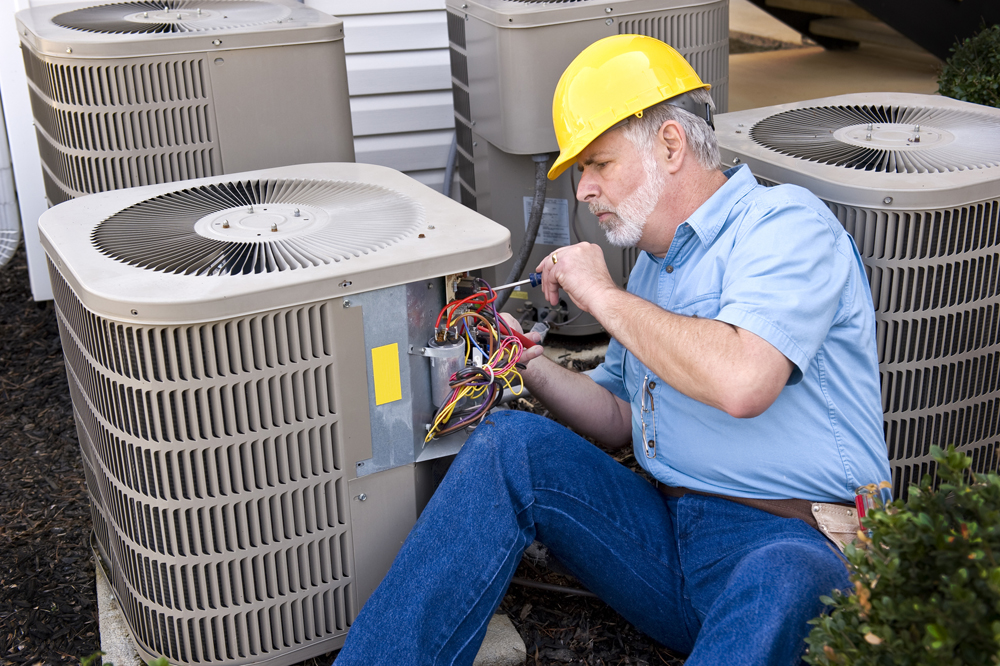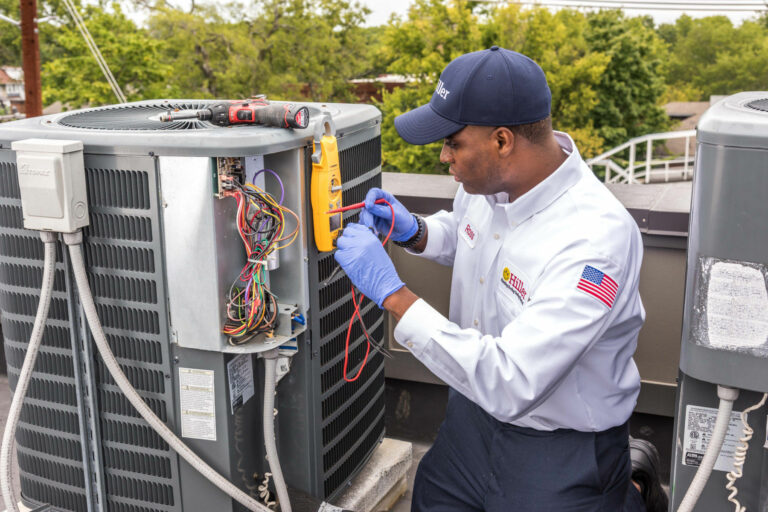Choosing the Right Time for furnace replacement
Choosing the Right Time for furnace replacement
Blog Article
Choosing Between a Heatpump and Heating System: Secret Factors To Consider for Your Heating And Cooling Requirements
When examining heating choices for a/c requires, the decision in between a warmth pump and a furnace can be complex. Each system supplies unique benefits customized to certain climates and energy efficiency objectives. Comprehending these differences is vital for making an informed selection. Secret elements such as installment expenses and environmental influence even more make complex the selection process. Which alternative genuinely lines up with one's convenience and sustainability preferences? The following sections will explore these factors to consider thoroughly.
Understanding Warmth Pumps: Exactly How They Work and Their Advantages
While numerous house owners take into consideration different home heating alternatives, recognizing just how warmth pumps function and their advantages can greatly influence their choice. Heatpump operate by moving heat instead of creating it. In the wintertime, they extract warmth from the outside air or ground and move it indoors, while in the summertime, they reverse this procedure, cooling down the home by getting rid of warmth outside. This double capability makes them versatile for year-round environment control.One of the primary benefits of heatpump is their power efficiency. They utilize substantially much less electrical power contrasted to standard furnace, potentially leading to lower energy costs (furnace replacement). Furthermore, heat pumps have a smaller carbon impact, making them an eco-friendly choice. They likewise require much less upkeep than conventional systems, adding to long-term cost savings. Generally, understanding the auto mechanics and advantages of heatpump can assist home owners make informed decisions regarding their heating and cooling requirements
Exploring Heaters: Kinds, Procedure, and Benefits
Heating systems are available in different kinds, consisting of gas, electrical, and oil designs, each with distinctive functional mechanisms. Recognizing these distinctions is important, as they impact efficiency and heating efficiency. Furthermore, heaters supply countless advantages, such as consistent heat result and reliability in cooler climates.
Sorts of Furnaces
Furnace can differ significantly in design and procedure, with heating systems being a popular option amongst homeowners. There are a number of sorts of furnaces, each using various gas sources and modern technologies. Gas furnaces are typical, leveraging all-natural gas to create heat efficiently. Electric heaters, on the other hand, utilize electric resistance to generate warmth, commonly favored for their straightforward setup. Oil heaters, while less common, are effective in areas with limited gas gain access to (heat pump replacement ooltewah tn). Additionally, condensing furnaces maximize energy effectiveness by recycling and recording exhaust gases. Each type operates via a system of warmth exchangers and ductwork to distribute cozy air throughout a home. Understanding the differences between these heating system types is crucial for educated HVAC decisions
Benefits of Heaters
For homeowners seeking reliable warmth during chilly months, the advantages of heaters are significant. Heating systems offer regular home heating, making sure also temperatures throughout the home. They are particularly efficient in severe cool, often surpassing heatpump in freezing problems. Various types, including gas, electrical, and oil furnaces, use flexibility to meet varied demands and preferences.Furnaces also tend to have lower initial installment expenses contrasted to warm pumps, making them an extra accessible choice for numerous. Their robust style contributes to a longer lifespan, with many systems lasting over 15 years with appropriate upkeep. Additionally, contemporary furnaces are frequently furnished with advanced modern technology for boosted performance, which can result in lowered energy bills. Generally, heaters remain a reliable option for reliable home heating.

Energy Efficiency: Contrasting Warmth Pumps and Furnaces
When contrasting energy performance in between warm pumps and furnaces, the Seasonal Energy Effectiveness Ratio (SEER) plays a vital role in figuring out performance. Furthermore, an operational expense evaluation exposes the lasting financial ramifications of each system. Understanding these variables can direct house owners in making notified decisions regarding their heating remedies.
Seasonal Energy Effectiveness Proportion
Energy performance plays a necessary duty in the decision-making procedure between heatpump and heating systems, particularly when taking into consideration the Seasonal Energy Effectiveness Proportion (SEER) This statistics actions the cooling performance of heat pumps over a whole air conditioning season, offering a standardized method to assess efficiency. Higher SEER scores indicate higher energy performance, equating to lower energy usage and lowered utility costs. In contrast, heating systems are commonly examined making use of the Yearly Gas Application Effectiveness (AFUE) score, which shows heating efficiency. When comparing these 2 systems, property owners ought to focus on SEER rankings for heat pumps, as they directly effect general energy cost savings and ecological sustainability. A detailed understanding of SEER can especially influence the long-lasting satisfaction and cost-effectiveness of the chosen heating and cooling option.
Operational Cost Evaluation
Comprehending the functional expenses related to warmth pumps and heating systems is vital for house owners evaluating their choices. Heatpump generally offer greater power effectiveness, transforming electrical power right into warm with minimal waste. This leads to lower monthly utility bills, particularly in moderate climates. On the other hand, conventional heating systems, particularly gas models, might have lower in advance prices why not try this out yet can sustain greater operational expenses gradually as a result of sustain rates and effectiveness ratings.Moreover, warmth pumps can work as both home heating and cooling systems, possibly lowering the requirement for separate a/c systems. While preliminary investments for heat pumps might be greater, their lasting financial savings in energy efficiency can make them a much more cost-efficient option for many families. Cautious analysis of neighborhood power prices is necessary to figure out the very best option.
Installation Prices: What to Anticipate for each and every Heating Unit
Installation prices for furnace can vary substantially between heat pumps and heating systems, affecting home owners' decisions. Heatpump typically have higher upfront setup costs, generally ranging from $3,500 to $8,000, depending upon the unit size and complexity of installment. This consists of the outside system, indoor handling system, and needed ductwork adjustments. Alternatively, heating systems often tend to have lower initial prices, averaging in between $2,500 and $6,000, which can be appealing for budget-conscious homeowners. Setup costs can boost if comprehensive ductwork is required.Moreover, the option of fuel type for heaters-- all-natural gas, lp, or electrical-- can additionally affect installation prices. While warm pumps supply power effectiveness, their initial financial investment might discourage some buyers. Ultimately, assessing setup prices along with lasting financial savings and efficiency will certainly assist house owners in making informed choices concerning their heater.
Climate Factors To Consider: Which System Executes Much Better in Your Location
Just how do environment conditions influence the effectiveness of home heating systems? The performance of warmth pumps and furnaces can vary substantially depending upon the local climate. In modest environments, warmth pumps succeed by successfully moving warmth from the outside air, making them an energy-saving option. Nonetheless, their performance decreases in extremely chilly temperature levels, where they might struggle to remove sufficient warm. Alternatively, furnaces, specifically gas versions, give regular and dependable warm no matter outdoor conditions, making them more suitable in cooler regions.In areas that experience milder wintertimes, heatpump can operate efficiently year-round, providing both heating & cooling. In comparison, regions with severe winters months commonly take advantage of the effectiveness of heaters. Eventually, understanding the local environment is necessary when determining in between a heatpump and a heating system, as it directly affects their operational efficiency and overall efficiency.
Upkeep Demands: Long-Term Take Care Of Warm Pumps vs. Furnaces
While both warm pumps and furnaces call for normal upkeep to assure peak efficiency, their certain needs and treatment routines differ substantially. Heating systems usually need less regular focus, with annual examinations sufficing to look for gas leaks, clean filters, and examine general performance. Their less complex layout frequently enables simple repairs.In contrast, heatpump require biannual upkeep due to their twin role in cooling and heating. This includes cleaning coils, checking refrigerant levels, and guaranteeing that both the outside and indoor systems operate at their ideal. Additionally, heat pump upkeep commonly entails even more elaborate parts, making professional servicing essential.Neglecting maintenance can cause lessened effectiveness and increased energy costs for both systems. Eventually, property owners must consider these long-term treatment demands when selecting in between a heatpump and a furnace, as proactive maintenance can prolong the life-span and efficiency of either system substantially.
Ecological Effect: Choosing a Lasting Home Heating Option
The ecological influence of home heating systems is a critical examination for property owners looking for lasting alternatives. Heatpump are typically more energy-efficient than standard heating try this site systems, as they transfer warmth as opposed to generate it, substantially lowering carbon exhausts. By utilizing eco-friendly power sources, such as geothermal or air-source warm pumps, property owners can better lessen their ecological footprint.On the various other hand, gas heating systems send out greenhouse gases and add to air contamination, though they typically provide higher warm result. Nonetheless, innovations in modern technology have caused the development of high-efficiency heaters that decrease emissions.Ultimately, picking a heating system includes evaluating performance versus environmental influence. Home owners are encouraged to assess local power sources and incentives for renewable systems, guaranteeing a selection that straightens with both individual comfort and ecological responsibility. The choice affects not only prompt convenience but likewise long-term sustainability and environmental health and wellness.
Regularly Asked Inquiries
How Lengthy Do Warm Pumps and Furnaces Typically Last?
The life-span of heat pumps commonly varies from 15 to two decades, while furnaces can last between 15 to three decades. Routine maintenance substantially affects their durability and effectiveness in giving heating options.
Can I Utilize a Warmth Pump in Incredibly Cold Climates?
Heat pumps can operate in exceptionally cool environments, but their performance decreases as temperature levels decrease. In such problems, supplemental home heating resources may be required to preserve comfy indoor temperature levels and ensure peak performance.

What Is the Noise Degree of Heat Pumps Versus Furnaces?
The sound levels of heatpump and heating systems differ substantially. Generally, heatpump run even more silently than traditional heaters, making them more suitable for those conscious sound, while heaters view website may produce louder functional sounds during heating cycles.
Are Heat Pumps Suitable for Both Home Heating and Air conditioning?
Heatpump are certainly suitable for both heating & cooling (ductless mini splits). They work by transferring heat, supplying effective temperature level control year-round, making them a flexible selection for homeowners looking for an all-in-one HVAC option
What Dimension Heater Do I Required for My Home?
Establishing the appropriate dimension heating unit for a home needs assessing aspects such as square video footage, insulation top quality, neighborhood climate, and the home's format. Consulting a specialist can ensure an accurate assessment and perfect convenience. Warmth pumps usually offer higher power performance, converting electric energy into warmth with marginal waste. In moderate environments, warm pumps excel by successfully moving warm from the outdoors air, making them an energy-saving alternative. Alternatively, heaters, specifically gas models, supply regular and trusted warm no matter of outdoor problems, making them more effective in cooler regions.In locations that experience milder winter seasons, warm pumps can operate efficiently year-round, giving both heating and air conditioning. Warmth pumps are typically a lot more energy-efficient than traditional heating systems, as they transfer warmth instead than produce it, substantially minimizing carbon emissions. By utilizing renewable energy sources, such as geothermal or air-source warm pumps, property owners can even more reduce their ecological footprint.On the other hand, all-natural gas heaters give off greenhouse gases and add to air pollution, though they typically give greater heat outcome.
Report this page